HEY BASTARDS.
Katherine Rife is a familiar name to genre readers from her work with Mr. Skin and as a founding member of found footage maestros Everything is Terrible, and most recently, she’s the author of IF YOU LIKE QUENTIN TARANTINO, an examination of the media that both influenced and was influenced by Tarantino’s work. It’s a great book, a perfect gift for the friend or relative who’s just getting into grindhouse cinema, and you can read all about it here. I had the pleasure of talking to Ms. Rife at the Days of the Dead convention in Chicago last month — mercifully, I’ll take out the parts where we veered off-topic into areas like Roger Avery, women’s prison films and the distribution of 3-D movies.
P: Why do you think Tarantino has become such a gateway figure for getting into psychotronic film?
K: I can’t think of an American filmmaker who’s so well-known, I mean, my grandma knows who Quentin Tarantino is, where there’s something going on in their films where there is that content and that drive.
P: That makes perfect sense, because he’s someone that people aren’t into exploitation at least have an awareness of him, even if they don’t get the sources.
K: Yeah, even if they don’t know that there’s more there, they still know what it is. I think that if you do want to realize that the movies are kind of made of references, then you have this secret, special key and you feel like you’re on the inside or something, and that’s always very exciting.
P: You said the first Tarantino film you’d seen was PULP FICTION.
K: Yeah, when I was not allowed to go.
P: That is the best time to see movies. My dad was pretty permissive about what I watched, so I never had that forbidden aspect to things, so I kind of envy those that did in a weird way.
K: Yeah, but at the same time, that kind of gives you a handicap, because you haven’t seen all these basic movies when you were a kid because you weren’t allowed. So you have to wait until your 15, 16 years old because you finally get to see THE TEXAS CHAIN SAW MASSACRE or FRIDAY THE 13TH, and the kids that saw this when they were little are way ahead of you by that point.
P: So when you saw something like PULP FICTION, what did that inspire you to start watching?
K: BLUE VELVET was the next movie I saw that made a big impression on me, but I wouldn’t draw a straight line between the two. It was more like a launching point for getting into movies.
P: It just kind of opened your eyes to what movies could be.
K: Yeah. It was definitely that I really wanted to watch R-rated movies, I was like “R-Rated movies are cool!”
P: Then you end up watching THE RICH MAN’S WIFE and everything’s terrible.
K: Yeah! But PULP FICTION was really the movie that made me say, “I like movies. I want to watch all the movies.” But it was actually when KILL BILL came out what I started to do, like, serious study. Where I’d take my little notepad and write down all the movies that he’d mentioned in interviews about KILL BILL. That’s when I saw my LADY SNOWBLOOD and my LONE WOLF AND CUB and my FIVE FINGERS OF DEATH. So it was more KILL BILL.
P: Which makes sense, because I think of all of his movies, KILL BILL has the most direct straight lines in them to their influences.
K: Yeah, exactly. It’s more like a rap album, really. His movies are inspired by things. It wouldn’t be right to call JACKIE BROWN a “Blaxploitation” movie, it was just inspired by some of that. It was more inspired by Pam Grier an the aesthetic of the movies in general. But KILL BILL is a straight up mixtape. It’s not “inspired” by, it’s literally made out of the movies he loves.
P: Yeah, like “Here’s the eye patch from THRILLER.”
K: Yeah, and we’re going to have Bill step out on the porch to the exact same musical queue that Angel Eyes does [in THE GOOD, THE BAD AND THE UGLY].
P: Or using the same framing as COMIN’ AT YA. Though that may have just been a coincidence. Now, your exclusion in the book of FOUR ROOMS —
K: –was deliberate! I hate that movie so much. There’s one toss-away line where I call it “an unfortunate, coke-addled mess.” I didn’t put it in there on purpose. I couldn’t think of a single nice thing to say about FOUR ROOMS so I left it out.
P: The Robert Rodriquez segment is pretty fun.
K: Yeah, it’s cute, and I could have pointed it out as “yeah, you can see where he’d go on to make SPY KIDS,” but my God, that Tarantino thing is painful.
P: True, you’d just have to say, “Just watch the Alfred Hitchcock Presents episode. It’s the same thing.”
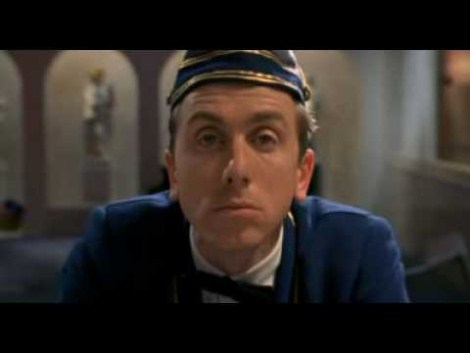
K: Except better, and without people talking way too fast. I also left out KILLING ZOE.
P: Well, he didn’t really have a lot to do with that, and you don’t go heavily into the films he just wrote, other than TRUE ROMANCE.
K: That’s true. But I left out KILLING ZOE on purpose because it’s awful. But with FOUR ROOMS, I wanted this to be a book of things that people would walk into and be excited about, and not FOUR ROOMS.
P: You didn’t want to have a chapter on good directors doing terrible anthology films?
K: That would have been an amazing sidebar!
P: Y’know, “If you liked FOUR ROOMS, you’ll love the 1967 CASINO ROYALE.” A piece on “bloated, auteur messes.”Were there things you’d wanted to include in the book that you felt were too excessive or too unknown? That you were worried that using Tarantino as a gateway it might be a little much to jump into? I know you mention THRILLER: A CRUEL PICTURE, which…
K: It’s a lot.
P: Yeah, for someone new to the world of exploitation to get into.
K: Honestly, rape/revenge is one of my favorite genres. I love rape/revenge movies.
P: You mention A GUN FOR JENNIFER in the book, which I was impressed by.
K: Yeah, that’s one of my favorite genres. I think it’s so interesting. That, and Nazisploitation. Whenever people talk about it, they always talk about it in this really detached, academic way. I think it’s because they’re afraid to be seen that they like it. But I feel like a lot of exploitation movies have things that you could feel is problematic, like from a feminist perspective, like how in a revenge movie, somebody’s girlfriend has to get raped for that to happen. So there’s something so simple about a rape/revenge movie where it’s not like the boyfriend getting revenge for the raped girlfriend, it’s the girl going, “fuck you, I’m going to cut your balls off.”
P: There’s something cathartic about it.
K: Literally in some cases. It’s just so simple and eloquent.
P: Even, as you mention in the book, THE GIRL WITH THE DRAGON TATTOO.
K: Yeah. But in a classic rape/revenge movie, it’s a very simple story. It’s all in the approach. I SPIT ON YOUR GRAVE is one of the more uncomfortable ones for me, because the scene is so long and so graphic, and it just goes on and on. That’s more troubling for me than most movies of the like. I’ve just detached myself from that ? it’s fun to talk about.
P: Despite the exploitation heritage, Tarantino clearly loves women. There’s clearly a large respect for women in his films. Well, not RESERVOIR DOGS.
K: Yeah, I was thinking about that, and the most throwaway female character that he has is Lee in DEATH PROOF, the actress that’s not in on the joke, and he sort of implies that they’re leaving her to rape her. He doesn’t make the ladies in his movies take their tops off for set decoration or anything, where, if you’re drawing from exploitation film, doing a literal interpretation, you’ve got to have boobs in there!
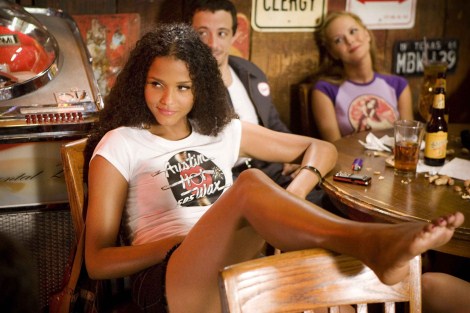
P: Now, was the accessibility of these movies something you took into consideration when putting the book together?
K: I mention if they’re not easily purchasable, like a lot of the spaghetti westerns are pretty out of print at the moment. I think that’s probably going to change next year after DJANGO UNCHAINED comes out. Because you can now get Enzo Castellari movies on DVD, and they all came out after INGLORIOUS BASTERDS. There should be a ripple effect, and you should be able to get DAY OF ANGER, which is long unavailable.
P: Yeah, Wild East’s release was years ago.
K: Some of them have lapsed into the public domain, and I mention that, like DEATH RIDES A HORSE can be watched on archive.org. There’s also a great print of it on Netflix streaming. If it’s especially hard to get, like THE SAVAGE SEVEN, I’d mention it, but I’d limit something like that only to movies I really didn’t think I could leave out. Or if I’d specifically read an interview where Tarantino had mentioned the film.
P: It shouldn’t have been hard to track that down – -Tarantino mentions about 80 movies each time he’s interviewed.
K: I know! There was this Playboy interview that came out yesterday he said a movie that inspired INGLORIOUS BASTERDS and it wasn’t in the book, and I was like, “fuck!” Because I remember seeing it and thinking, “Oh, that’s a good one.”
P: What was it?
K: It was HITLER:DEAD OR ALIVE.
P: I’ve heard of it, but haven’t seen it. War movies are kind of my blind spot. There’s just a lot out there, and I’ve seen the original INGLORIOUS BASTARDS and a few others here and there, but haven’t really explored them.
K: Yeah, you can fall into a black hole in just about any genre.
P: Martial arts films are like that, too.
K: I was going to mention that. With kung fu movies, you can just go forever and ever and ever. I basically stuck with the early ‘70s stuff, basic stuff like Jimmy Wang Yu and Lo Leih.
P: Was that a danger when you were writing, just wanting to go off and list everything?
K: Yes. I had these lists of like 50, 60 titles, and was like, “I have to pick two off of here.” That’s where I had to make the rule where if he’d name-checked it, congratulations, it’s in. And there were some things I deliberately left out because I’d read that he said he wasn’t a fan of it. Like, I would have assumed that he would have been a BRANDED TO KILL fan, but he said he’s not. He’s not a fan of [Seijun Suzuki].
P: Weird. That doesn’t make sense to me.
K: It doesn’t make sense at all! But I was like, “Okay, that just makes the cutting down process easier.”
P: You kind of want to put in a “Also, Quentin Tarantino was influenced by Seijun Suzuki, which he says he’s not but he totally was.”
K: Yeah, like he’s lying, because he doesn’t want people to know where his ideas came from. [laughs]
P: He’d be all pouty and retire.
K: He says he’ll retire after he makes three more movies.
P: Right, sure. He hasn’t done a women’s prison movie yet!
K: It’s true, whenever a genre hasn’t been around for a while, he’ll step in.
P: What do you think about Tarantino naming DEATH PROOF as his “worst movie?”
K: I agree with him, actually. I read “Men, Women and Chainsaws”, the book he said inspired it, and I appreciated it more after that, but marrying a grindhouse double feature and an academic feminist analysis of the “final girl” theory was a misstep, I think. I know he tries to aim high and play with audience expectations and all that, but that time it backfired.
Here’s the quote:
In a weird way this goes back to DEATH PROOF, because one of the biggest inspirations for the film, especially the first half of the movie – the more slasher-oriented section – was Carol Clover’s book Men, Women and Chainsaws. I really truly think that her chapter on the ‘final girl’, the role that gender plays in the slasher film, pins down the best piece of film criticism I’ve ever read. It gave me a new love for slasher films and one of the things that I was doing when I was watching that movie was applying her lessons.
That book is great, by the way. Maybe it was the marketing that killed it? People went in expecting a bloodbath and that’s NOT what they got…
P: True, especially since those that saw it in the theater had just watched PLANET TERROR, which was the promised bloodbath – switching to something a bit more theme and character-driven like that caused a fair share of disgruntlement from a lot of people I know. It certainly is a fascinating book (It may have been the first academic discussion of horror films that I’d ever read.) but I don’t know if it works as well in the context of a Tarantino film.
K: I totally agree. I would love to see someone else try to incorporate Clover’s analysis into a slasher film though, using the lessons learned from DEATH PROOF.
P: I really appreciated your piece on Kinja Fukasaku, by the way. I think he gets mostly thought of as the “BATTLE ROYALE/GREEN SLIME” guy, but he’s done so much more fascinating stuff.
K: Oh thanks! BLACK LIZARD might be my favorite of his films. I am a sucker for camp though.
P: Yeah, I love BLACK LIZARD too — your mention actually spurred me to rewatch it.
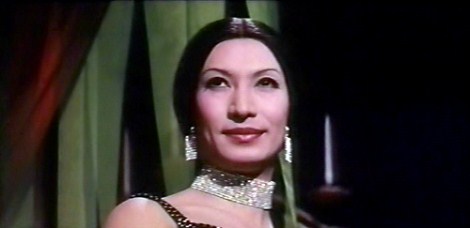
K: The star of that movie, Akihiro Miwa, is FASCINATING.
P: No kidding! I’m kind of oddly fascinated with the cinematic careers of professional female impersonators, and Miwa is an enigma even within that minor group. What kind of decision making process was it to have sections on a fimmaker as opposed to a specific movie or movies? I could have easy seen Jack Hill essentially getting his own chapter.
K: Well, honestly the whole book was a process of elimination because there’s SO MUCH I could have put in there but didn’t. My editors had to remind me a couple times that this couldn’t be a multi-volume tome… which would have been very Tarantino of me, actually I actually ended up having to cut over 10,000 words from the manuscript I originally submitted. So some things just kinda got condensed.
P: No doubt, I couldn’t imagine how much you could have done — hell, just look at the number of “best of” Tarantino lists that are coming out now with the DJANGO UNCHAINED release.
K: Exactly. His Sight & Sound Top 10 also changed quite a bit this year from 2002, which was maddening.
P: Were there things you would have included?
K: With DJANGO, definitely. When I was writing the book, all that was out there was that picture of Christoph Waltz and Jamie Foxx walking through the Old West town. I saw that the street was muddy- like, Corbucci muddy- behind them, so I told myself “well, we’ll go from there. A BULLET FOR THE GENERAL and THE GRAND DUEL were two that I should have put in there.
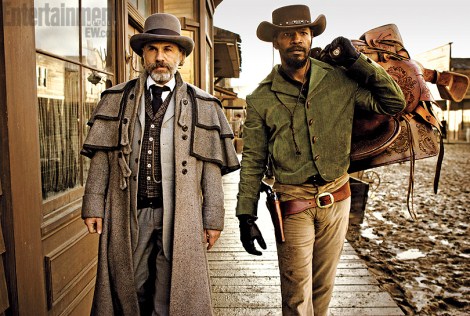
K: Some of the titles I cut were TRUCK TURNER, DIXIE DYNAMITE, CLEOPATRA JONES, ZERO WOMAN: RED HANDCUFFS, and a bit on his CSI episode. The rabbit hole is so, so deep. You could probably put out a new one of these books every year.
P: Or at least every movie. TRUCK TURNER is a favorite of mine — especially as one of the few non-Star Trek Nichelle Nichols roles.
K: Oh man, the pimp funeral in that movie is glorious. I also enjoy the pimp softball game in THE MACK- anything to bring all that polyester into the sunlight, really.
P: How are things going with your next book, If You Like Bruce Lee?
K: It’s coming along, with kung fu movies there’s a lot of confusion with names and titles to sort through but the pieces are coming together in my mind. Hopefully I can convey that clarity on the page, too.
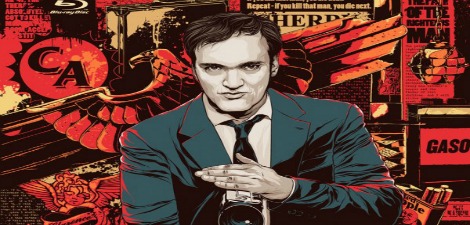
KEEP THE POPCORN BUTTERED AND BURNT,
P
- [THE BIG QUESTION] WHAT’S YOUR FAVORITE FEMALE ENSEMBLE IN MOVIES? - July 22, 2016
- [IN THEATERS NOW] THE BOY (2016) - January 24, 2016
- Cult Movie Mania Releases Lucio Fulci Limited Edition VHS Sets - January 5, 2016

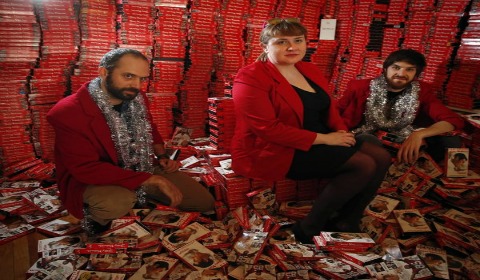
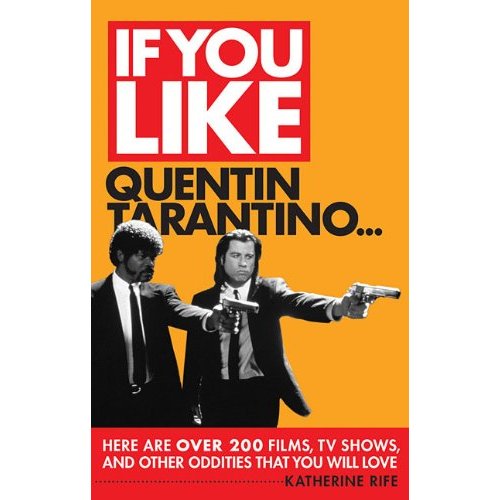




I m from Brazil and I have a very good history to make a movie,very gooood tarantino style it s about a family saga!!!Oscar garanted.. if you are instered on it please let me know….
i will like to join the movie company
Um…. I’ve heard Quentin praise Suzuki on several ocassions – particularly Tokyo Drifter. I find it EXTREMELY hard to believe he’s not a Fan!